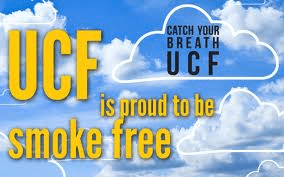
Almost 50 percent fewer students are smoking since UCF declared itself a smoke-free campus in 2012. And that improvement shows the power of teamwork, education and the environment in improving health.
Six years ago, when our university decided to go smoke-free to improve health, UCF Student Health Services (SHS) took the lead and launched a marketing campaign that focused on educating student smokers rather than punishing them for violating school policy. Those efforts continue today.
Student Health Services provides information about the health risks of smoking and offers smoking cessation programs. Students can get prescribed smoking cessation therapies at reduced prices at the service’s pharmacy. SHS hosts a website, http://smokefree.sdes.ucf.edu/, with information to support students who want to quit. It has also trained students, faculty and staff on how to approach a smoker on campus to ask them to stop – and to provide information on quitting.

“Cigarette smoking is the leading cause of preventable disease and death in this country,” said Dr. Michael Deichen, executive director of UCF Student Health Services. “It is responsible for one in five deaths. Through prevention and education, we’re trying to help young people see that if they start smoking before the age of 25, they begin their adult lives addicted. And that addiction impacts them for years – and some for a lifetime.”
Dr. Deichen said a smoke-free campus environment is vital to keeping students smoke-free because occasional smokers who are regularly exposed to smoking often become daily users of tobacco. “Environment has a huge impact on what we do,” he said. “When we began our smoking cessation classes, we found people coming to us who desperately wanted to quit. They knew smoking was a health risk. Many had tried to quit before but were unsuccessful. But, by engaging in our support and being in an environment that was smoke-free, they were able to quit. I see many of these people now, and they are incredibly grateful.”
In 2012, 2.9 percent of UCF students reported that they were daily smokers, according to the National College Health Assessment research tool SHS uses to collect data. By 2017, that number had dropped to 1.5 percent. Six years ago, 10.6 percent of UCF students reported they had smoked at least once in the last 30 days. In the latest survey, the number dropped to 5.2 percent. The national rate is 13 percent for 18- to 24-year-olds.

The use of vapes (electronic cigarettes) has not had an impact on tobacco use, as e-cigarette use has remained at about 2 percent in the last six years, according to the survey. Vaping is also prohibited campus-wide.
Student Health Services has more than 68,000 patient visits per year, and providers talk to each student about their smoking habits and other potentially addictive behaviors. They use a process called “motivational inquiry,” asking students how much they spend on cigarettes and whether students believe their smoking is positively or negatively impacting their health and why. The goal, Dr. Deichen said, is to help student smokers reach their own conclusions – that smoking is a costly, dangerous habit – and then provide services to help them quit.
“It’s wonderful to see the progress we’re making,” he said.
Indeed.


